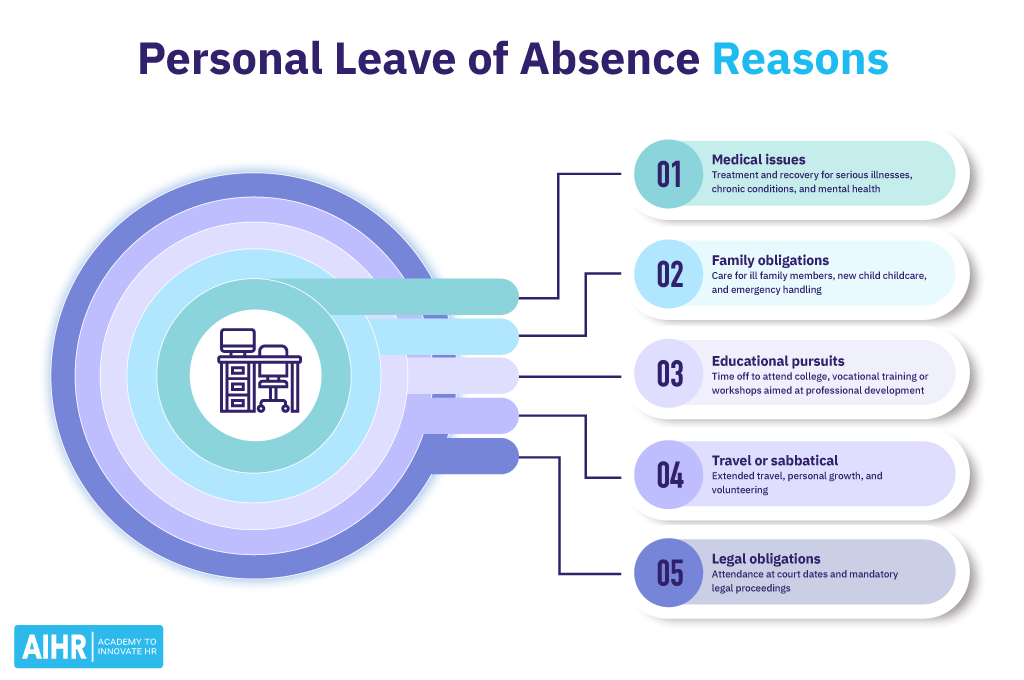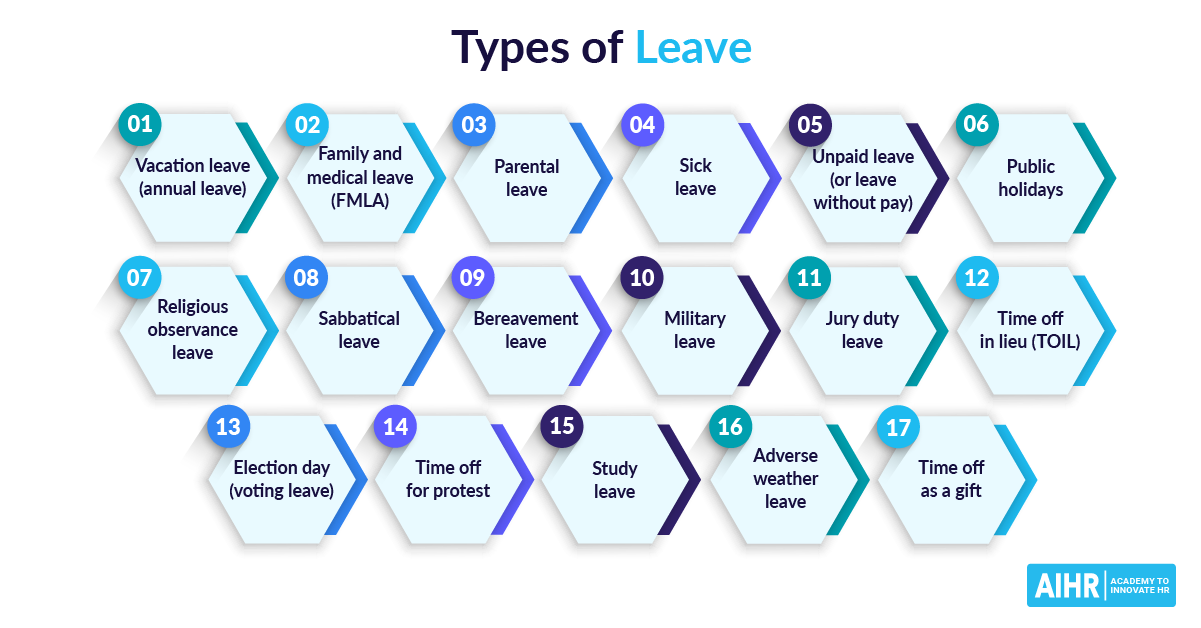Personal Leave
What is personal leave?
Personal leave is a type of extended leave of absence typically reserved for complex situations that require more time off than standard PTO or sick leave can provide.
This kind of leave is typically used in circumstances such as long-term personal health issues, extended caregiving for family members, bereavement, or other significant personal matters that necessitate prolonged absence from work.
Personal leave vs. vacation
| Personal leave | Vacation | |
| Purpose | Often used for health, family, or personal issues. | Primarily for rest, relaxation, and personal pursuits. |
| Eligibility | May depend on specific criteria like illness or family emergencies. | Generally available to employees as a benefit. |
| Notice | Can be with minimal notice due to its nature. | Usually requires advance notice and approval. |
| Pay | Often paid, but depends on company policies. | Typically paid, forming part of the employment benefits. |
| Mandatory laws | Often subject to legal regulations (e.g., sick leave laws). | Less regulated, more at the discretion of the employer. |
Annual leave vs. personal leave
Annual leave is paid time off used for rest and recreation, typically planned and scheduled in advance. This type of leave is accrued based on the employee’s length of service and usually ranges from a few days to weeks.
On the other hand, personal leave is intended for personal matters such as illness or family emergencies. It’s often not planned and might require some form of documentation as proof, like a medical certificate, especially if it extends beyond a certain number of days.
Personal leave of absence reasons
Some of the most common reasons for taking a personal leave of absence include:
- Medical issues: This encompasses undergoing treatment for a severe illness, managing chronic health conditions, or needing extended recovery time after surgery. It also covers mental health concerns like stress, anxiety, or depression.
- Family obligations: This category includes caring for a family member with serious health issues, handling childcare responsibilities, especially in case of a new child (beyond standard parental leave), or dealing with family emergencies.
- Educational pursuits: This involves taking time off to attend college, vocational training, workshops, or seminars that are aimed at personal or professional development.
- Travel or sabbatical: This includes taking a sabbatical for extended travel, personal growth, or volunteering.
- Legal obligations: Another personal leave example can include attending legal matters such as court dates or other mandatory legal proceedings.

Personal leave of absence laws
Several federal, state, and local laws protect the rights of employees to take most types of leave. Some of the most significant federal personal leave laws include:
- Family and Medical Leave Act (FMLA) permits eligible employees to take up to 12 weeks of unpaid, job-protected leave annually for certain family and medical situations. In some cases, such as for certain military caregivers, it can extend to 26 weeks.
- Americans With Disabilities Act (ADA) requires employers to provide reasonable accommodations for employees with disabilities, including leave beyond what is typically offered.
- Uniformed Services Employment and Reemployment Rights Act (USERRA) provides rights and protections for military members, including the right to take leave from their civilian jobs for military service and to return to their jobs with accrued seniority and other protections.
These federal laws are foundational to understanding employee leave rights in the US. It’s important to note that specific state and local laws can provide additional leave rights, and implementing these laws can vary based on the employer and the situation.
HR tip
Providing personal leave to employees reflects a company’s commitment to their wellbeing, leading to increased loyalty and productivity.
How can HR develop a personal leave of absence policy?
Developing a personal leave of absence policy requires thoughtful consideration of multiple aspects to ensure it is fair, compliant with legal requirements, and aligns with the company’s values and operational needs. Here are five steps to follow:
- Clearly articulate who is eligible for personal leave (e.g., full-time, part-time, tenure with the company) and under what specific circumstances (e.g., health issues, family care, personal development).
- Research federal, state, and local laws impacting personal leave to ensure compliance. This step is crucial to avoid legal issues and ensure fair treatment of employees.
- Create a detailed list of qualifications and policies for each category of personal leave. This should include the reasons for leave, required documentation, and any other relevant details.
- Determine the frequency and duration of each type of personal leave and whether the leave will be paid or unpaid.
- Develop a straightforward process for employees to request leave. This should include application steps, required forms, approval processes, and timelines. Ensure this process is communicated effectively to all employees.
- Consistently review and update the policy to adapt to changing legal requirements, company needs, and employee feedback.
FAQ
Personal leave is not the same as PTO. Personal leave often refers to an extended, specific-purpose absence for addressing unique personal situations, which can be paid or unpaid, while PTO is paid time off that employees can use for various reasons, including vacation and sick days, and is usually paid.
Personal leave can be paid or unpaid, depending on the employer’s policies and the country’s labor laws. Larger companies and organizations often offer paid personal leave as part of their benefits package, while smaller businesses might not provide this perk.







